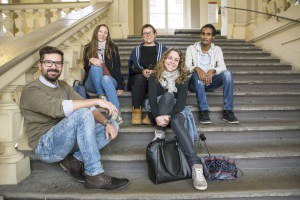International Relations: Why this programme
International Relations is a highly qualified 2nd cycle degree programme aimed at providing students with a number of key skill bys and competences to compete in the international labour market, comprising both private and public sector. Students will get a broad and multidisciplinary view of the most recent economic and political phenomena, as well as an in-depth insight of the key differences that mark Asia, Africa, Americas and Europe as different regions in the world.

The programme offers different curricula taught in English:
- European Affairs,
- International Affairs,
- Forecasting Innovation and Change (not available for a.y. 2022/2023),
- Crime, Justice and Security
entirely taught in English, recognized as international by the University of Bologna. They are meant to attract qualified EU and non-EU students as well as Italian students.
European Affairs
It offers students the opportunity to specialise in topics such as EU external relations, foreign policy, economic and trade policy, as well as the social and cultural dimensions of the European integration process. This curriculum aims at training future experts in European Union affairs, policies and institutions, offering a comprehensive programme of instruction for students keen to work in the European public or private sector. The curriculum provides students with a deep knowledge of four macro-areas: political science, economics, area studies and European politics and Institutions. A wide range of elective courses is offered that allows our graduates to stand out for their cross-cutting understanding of global issues that influence European politics. Students have also the possibility to learn another European language among French, German, and Spanish, which will enhance their possibility to embark on an international carrier.
International Affairs
It aims at creating analysts able to investigate, understand and build geopolitical strategies, conflict mediation and security policies in the international context. The curriculum encourages the participation of students from different fields of studies and cultural backgrounds and it trains specialists able to critically analyse political systems, the relationships between them, the reason for tensions and the political and economic role of international organizations, including the EU. The degree programme includes some core course units on the evolution of the international political and economic system, providing grounding for more specialised course units.
A wide range of elective course units is available in politological, economic, historical, sociological and legal areas, developing flexible, interdisciplinary figures.
Forecasting Innovation and Change
It aims to provide students with a set of tools for implementing foresight thinking while dealing with the traditional topics of interest in the International Relations field. The curriculum core courses are related to foresight methodology, ranging from quantitative and qualitative methods to innovative future design techniques.
Crime, Justice and security
It intends to provide students with adequate tools in different macro areas: politology, sociology, criminology, and analysis of the borders, with a special focus on legal theory and analysis.
Admission Requirements and Study Plans
Here you can find the study plans of the degree programme, while information about admission requirements and procedures is available in the section How to apply / Enrollment.
Tuition Fees
From the a.y. 2015/16 the curricula European Affairs and International Affairs were recognized as international courses: all activities are entirely held in English; there are specific courses and welcoming services as well as support tutors dedicated to all students enrolled in these two curricula. For this reason, the total amount of tuition fees for European Affairs and International Affairs curricula is 1.000 euros more than the basic tuition fee for this programme.
Tutor: didatticasociale.rilm@unibo.it